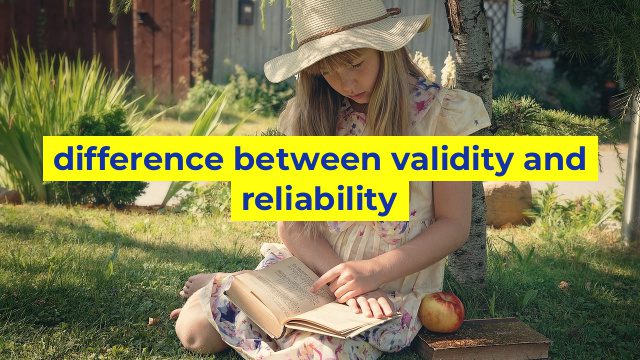The Difference Between Validity and Reliability
When it comes to research, two important concepts are validity and reliability. While these terms are often used interchangeably, they actually have distinct meanings and applications that are essential for any researcher to understand.
Validity
Validity refers to the degree to which a study measures what it is intended to measure. In other words, a valid study accurately assesses the variable or construct it claims to be studying. There are several types of validity, including:
– Content validity: The extent to which a measure covers all aspects of the intended concept or construct.
– Criterion-related validity: The degree to which a measure accurately predicts or correlates with other established measures of the same construct.
– Construct validity: The extent to which a measure accurately assesses an abstract or theoretical construct.
For example, if a researcher is studying depression, the validity of their study would depend on whether they are accurately measuring the symptoms and experiences that define depression. A valid instrument would include items that tap into the core features of depression, such as feelings of sadness, hopelessness, and loss of interest in activities. A study that uses a measure that is not specific to depression, or that fails to capture its defining features, would have low validity.
Reliability
Reliability, on the other hand, refers to the consistency of a study’s results over time and across different conditions. A reliable study produces the same results when replicated under the same conditions. Reliability can be affected by factors such as:
– Test-retest reliability: The degree to which a measure produces consistent results over time when administered to the same population.
– Internal consistency reliability: The degree to which items on a measure are strongly interrelated and measure the same underlying construct.
– Inter-rater reliability: The extent to which different raters or observers produce consistent results when measuring the same phenomenon.
For example, if a researcher is studying intelligence, the reliability of their study would depend on whether their measure produces consistent results over time and across different groups of people. A reliable instrument would yield similar scores for the same person on different occasions, and for different people who share similar abilities. A study that produces highly variable results or that shows poor consistency in measurement would be considered unreliable.
Conclusion
In sum, while validity and reliability are related, they are distinct concepts that serve different purposes in research. Validity refers to the accuracy of a study’s measurement and its ability to capture the intended construct, while reliability refers to the consistency of a study’s results over time and across different conditions. By understanding these two concepts, researchers can ensure that their studies are meaningful, trustworthy, and replicable.
Table difference between validity and reliability
| Validity | Reliability |
|---|---|
| Refers to the extent to which a measure assesses what it claims to measure | Refers to the consistency and stability of a measure over time |
| It is concerned with the accuracy and truthfulness of a measure | It is concerned with the consistency of results when the measure is repeated |
| Validity is essential for a measure to be useful and relevant | Reliability is essential for a measure to be dependable and trustworthy |
| There are different types of validity, such as face validity, content validity, criterion validity and construct validity | There are different types of reliability, such as test-retest reliability, inter-rater reliability, and internal reliability |
| Validity is the degree to which a test measures what it claims to measure | Reliability is the degree to which a test consistently measures what it claims to measure |

